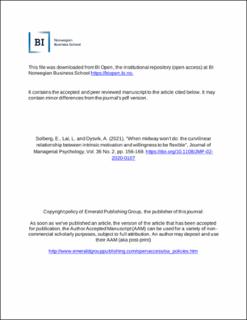When Midway Won’t Do: The Curvilinear Relationship Between Intrinsic Motivation and Willingness to be Flexible
Journal article, Peer reviewed
Accepted version

View/
Date
2021Metadata
Show full item recordCollections
- Scientific articles [2181]
Original version
Journal of Managerial Psychology, Vol. 36 No. 2, pp. 156-169. 10.1108/JMP-02-2020-0107Abstract
Purpose
Intrinsic motivation is held as critical for employees' willingness to be flexible (WTBF). Yet empirical research suggests that employees who find work intrinsically satisfying could resist work changes. In this study, the authors examine if a curvilinear relationship exists between these variables.
Design/methodology/approach
The authors predict that the relationship between intrinsic motivation and employees' WTBF will become more positive as intrinsic motivation advances beyond moderate levels. They examine the role developmental supervisor support plays in generating the critical threshold of intrinsic motivation needed for it to be positively related with WTBF. They test their hypotheses with survey data collected in three substantially different employee samples.
Findings
Data support the hypothesized curvilinear relationship between intrinsic motivation and WTBF. Developmental supervisor support is found to influence employee flexibility indirectly through its linear effect on intrinsic motivation and, in turn, the quadratic effect of intrinsic motivation on WTBF.
Practical implications
The study provides insight into how and when intrinsic motivation increases employees' WTBF and into the degree of developmental support needed to facilitate a positive relationship between these variables.
Originality/value
This is the first study to the author’s knowledge that empirically examines the relationship between intrinsic motivation and employees' WTBF.